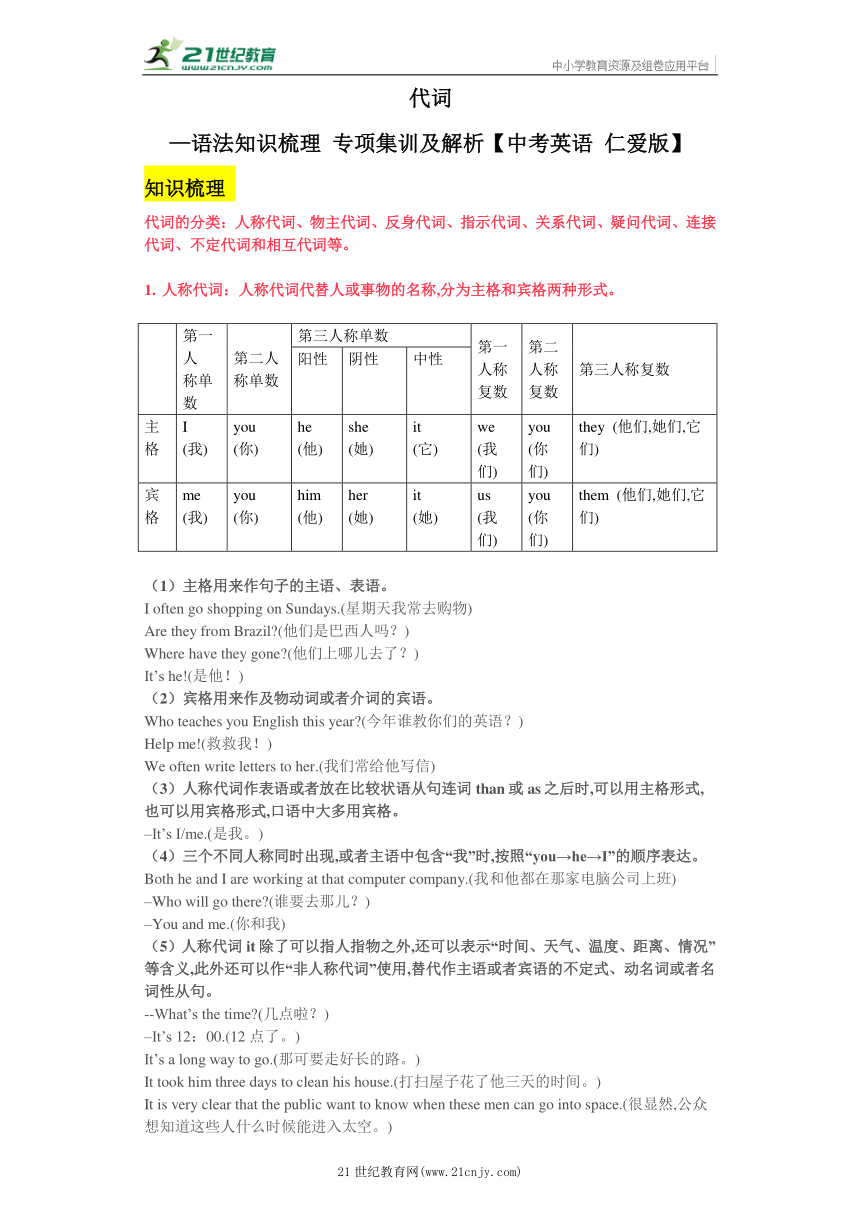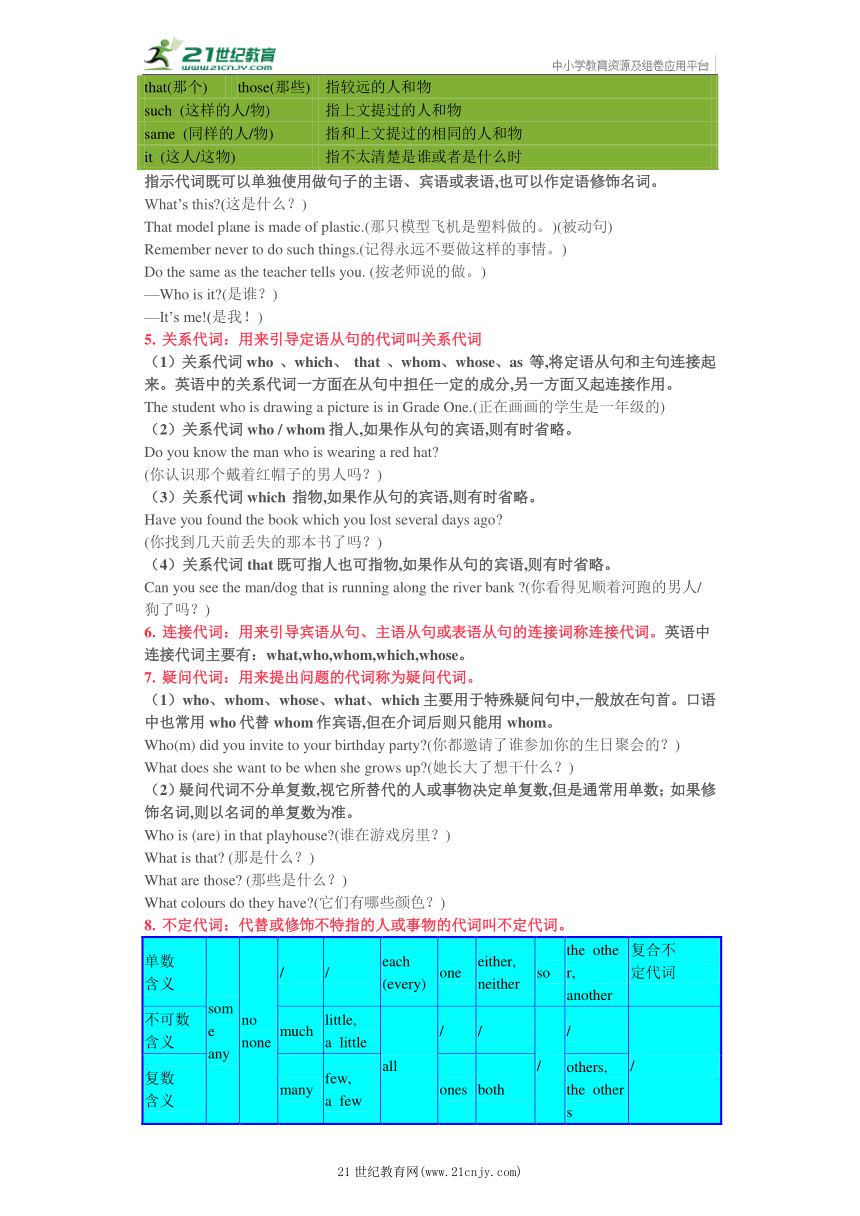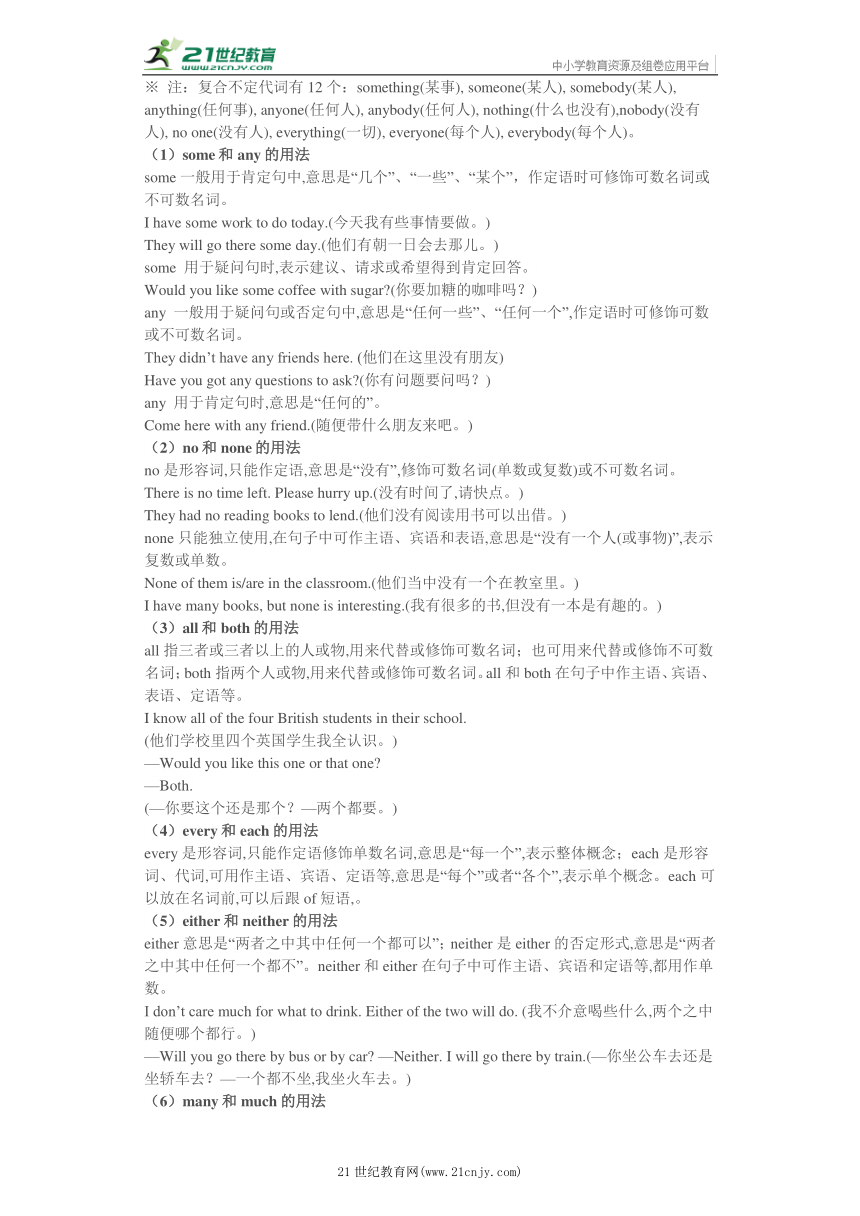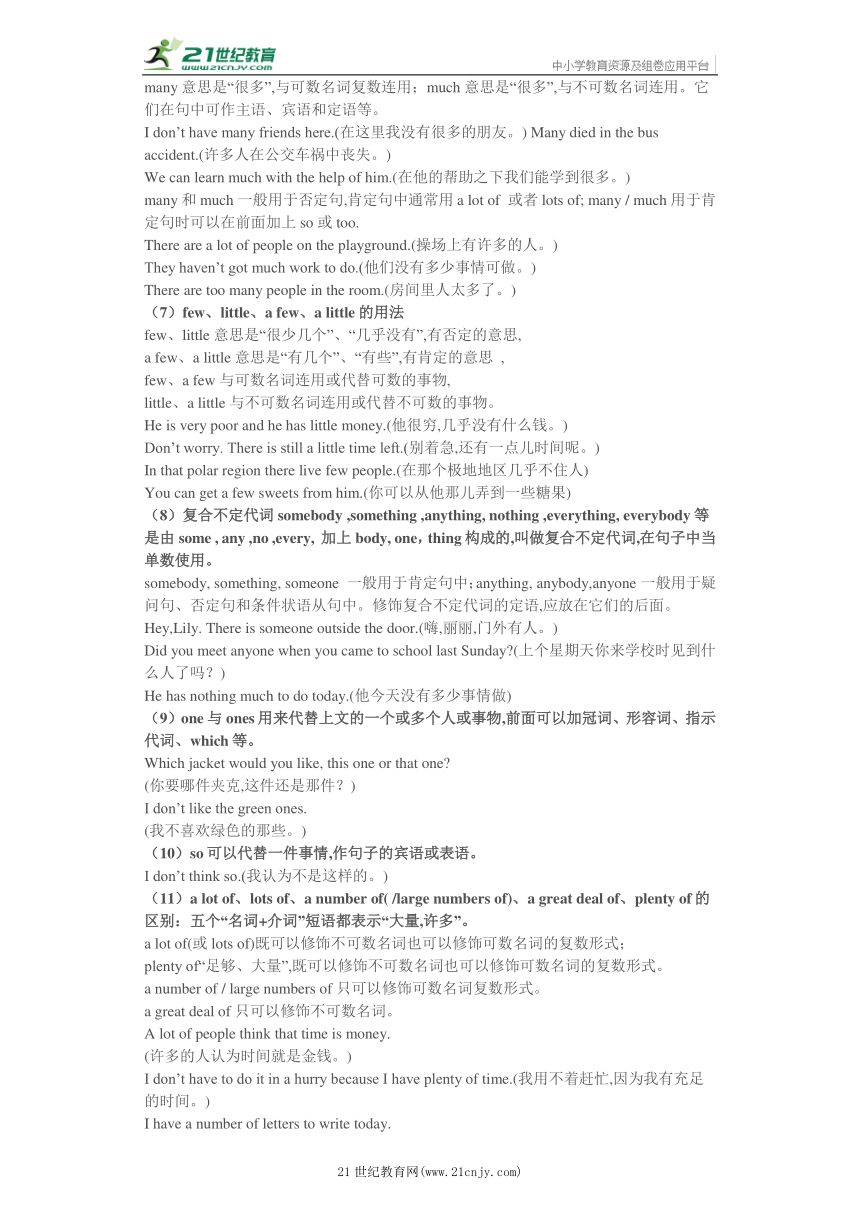代词—语法知识梳理+专项集训及解析【中考英语仁爱科普版】(含答案和解析)
文档属性
| 名称 | 代词—语法知识梳理+专项集训及解析【中考英语仁爱科普版】(含答案和解析) |  | |
| 格式 | docx | ||
| 文件大小 | 47.2KB | ||
| 资源类型 | 试卷 | ||
| 版本资源 | 仁爱科普版 | ||
| 科目 | 英语 | ||
| 更新时间 | 2024-01-29 12:23:48 | ||
图片预览





文档简介
代词
—语法知识梳理 专项集训及解析【中考英语 仁爱版】
知识梳理
代词的分类:人称代词、物主代词、反身代词、指示代词、关系代词、疑问代词、连接代词、不定代词和相互代词等。
1. 人称代词:人称代词代替人或事物的名称,分为主格和宾格两种形式。
第一人 称单数 第二人 称单数 第三人称单数 第一人称复数 第二人称复数 第三人称复数
阳性 阴性 中性
主 格 I (我) you (你) he (他) she (她) it (它) we (我们) you (你们) they (他们,她们,它们)
宾 格 me (我) you (你) him (他) her (她) it (她) us (我们) you (你们) them (他们,她们,它们)
(1)主格用来作句子的主语、表语。
I often go shopping on Sundays.(星期天我常去购物)
Are they from Brazil (他们是巴西人吗?)
Where have they gone (他们上哪儿去了?)
It’s he!(是他!)
(2)宾格用来作及物动词或者介词的宾语。
Who teaches you English this year (今年谁教你们的英语?)
Help me!(救救我!)
We often write letters to her.(我们常给他写信)
(3)人称代词作表语或者放在比较状语从句连词than或as之后时,可以用主格形式,也可以用宾格形式,口语中大多用宾格。
–It’s I/me.(是我。)
(4)三个不同人称同时出现,或者主语中包含“我”时,按照“you→he→I”的顺序表达。
Both he and I are working at that computer company.(我和他都在那家电脑公司上班)
–Who will go there (谁要去那儿?)
–You and me.(你和我)
(5)人称代词it除了可以指人指物之外,还可以表示“时间、天气、温度、距离、情况”等含义,此外还可以作“非人称代词”使用,替代作主语或者宾语的不定式、动名词或者名词性从句。
--What’s the time (几点啦?)
–It’s 12:00.(12点了。)
It’s a long way to go.(那可要走好长的路。)
It took him three days to clean his house.(打扫屋子花了他三天的时间。)
It is very clear that the public want to know when these men can go into space.(很显然,公众想知道这些人什么时候能进入太空。)
2. 物主代词:说明事物所属关系的代词,分为形容词性和名词性两种。
第一人 称单数 第二人 称单数 第三人称单数 第一人称复 数 第二人称复数 第三人称复数
阳性 阴性 中性
形容 词性 my (我的) your (你的) his (他的) her (她的) its (它的) our (我们的) your (你们的) their (他们的,她们的,它们的)
名词 性 mine (我的) Yours (你的) his (他的) hers (她的) its (她的) ours (我们的) yours (你们的) theirs(他们的,她们的,它们的)
(1)形容词性物主代词只能作句子中名词的修饰语,后面要跟名词。
Is that your umbrella (那是你的伞吗?)
I often go to see my aunt on Sundays.(我经常在星期天去看望阿姨)
They are their books.(是他们的书)
(2)名词性物主代词相当于名词,既代替事物又表明所属关系,在句子中往往独立地作主语、宾语或者表语,后面千万不可以跟名词。
This is your cup,but where is mine
(这是你的杯子,可我的在哪儿?)
Your classroom is very big, but ours is rather small.
(你们的教室很大,我们的相当小)
(3)“of + 名词性物主代词”称为双重所有格,作定语时放在名词的后面。
A friend of mine came to see me yesterday.
(我的一个朋友昨天来看我了) (指若干朋友中有一个来看我。)
My friend came to see me yesterday.
(我的朋友昨天来看我了)(指我的那个特定的朋友来看我。)
3. 反身代词:表示谓语的动作与主语有关或者宾语补足语的动作与宾语有关。
第一人 称单数 第二人 称单数 第三人称单数 第一人称复数 第二人称复数 第三人称复数
阳性 阴性 中性
myself (我自己) yourself (你自己) himself (他自己) herself (她自己) itself (它自己) ourselves (我们自己) yourselves (你们自己) themselves (他们/她们/它们自己)
(1)反身代词在句子中作宾语表示反射(指一个动作回到该动作执行者本身)。
Don’t play with the knife, you might hurt yourself.
(不要玩刀子,那会割伤你的)
(2)在句子中作同位语表示强调(即用来强调名词或代词的语气)。
The story itself is good. Only he didn’t tell it well.
(故事本身是好的,只是他没有讲好)
4. 指示代词:指示说明近处或者远处、上文或者下文、以前或者现在的人或事物。
单数 复数 含义
this(这个) these(这些) 指较近的人和物
that(那个) those(那些) 指较远的人和物
such (这样的人/物) 指上文提过的人和物
same (同样的人/物) 指和上文提过的相同的人和物
it (这人/这物) 指不太清楚是谁或者是什么时
指示代词既可以单独使用做句子的主语、宾语或表语,也可以作定语修饰名词。
What’s this (这是什么?)
That model plane is made of plastic.(那只模型飞机是塑料做的。)(被动句)
Remember never to do such things.(记得永远不要做这样的事情。)
Do the same as the teacher tells you. (按老师说的做。)
—Who is it (是谁?)
—It’s me!(是我!)
5. 关系代词:用来引导定语从句的代词叫关系代词
(1)关系代词who 、which、 that 、whom、whose、as 等,将定语从句和主句连接起来。英语中的关系代词一方面在从句中担任一定的成分,另一方面又起连接作用。
The student who is drawing a picture is in Grade One.(正在画画的学生是一年级的)
(2)关系代词who / whom指人,如果作从句的宾语,则有时省略。
Do you know the man who is wearing a red hat
(你认识那个戴着红帽子的男人吗?)
(3)关系代词which 指物,如果作从句的宾语,则有时省略。
Have you found the book which you lost several days ago
(你找到几天前丢失的那本书了吗?)
(4)关系代词that既可指人也可指物,如果作从句的宾语,则有时省略。
Can you see the man/dog that is running along the river bank (你看得见顺着河跑的男人/狗了吗?)
6. 连接代词:用来引导宾语从句、主语从句或表语从句的连接词称连接代词。英语中连接代词主要有:what,who,whom,which,whose。
7. 疑问代词:用来提出问题的代词称为疑问代词。
(1)who、whom、whose、what、which主要用于特殊疑问句中,一般放在句首。口语中也常用who代替whom作宾语,但在介词后则只能用whom。
Who(m) did you invite to your birthday party (你都邀请了谁参加你的生日聚会的?)
What does she want to be when she grows up (她长大了想干什么?)
(2)疑问代词不分单复数,视它所替代的人或事物决定单复数,但是通常用单数;如果修饰名词,则以名词的单复数为准。
Who is (are) in that playhouse (谁在游戏房里?)
What is that (那是什么?)
What are those (那些是什么?)
What colours do they have (它们有哪些颜色?)
8. 不定代词:代替或修饰不特指的人或事物的代词叫不定代词。
单数 含义 some any no none / / each (every) one either, neither so the other, another 复合不 定代词
不可数 含义 much little, a little all / / / / /
复数 含义 many few, a few ones both others, the others
※ 注:复合不定代词有12个:something(某事), someone(某人), somebody(某人), anything(任何事), anyone(任何人), anybody(任何人), nothing(什么也没有),nobody(没有人), no one(没有人), everything(一切), everyone(每个人), everybody(每个人)。
(1)some和any的用法
some一般用于肯定句中,意思是“几个”、“一些”、“某个”,作定语时可修饰可数名词或不可数名词。
I have some work to do today.(今天我有些事情要做。)
They will go there some day.(他们有朝一日会去那儿。)
some 用于疑问句时,表示建议、请求或希望得到肯定回答。
Would you like some coffee with sugar (你要加糖的咖啡吗?)
any 一般用于疑问句或否定句中,意思是“任何一些”、“任何一个”,作定语时可修饰可数或不可数名词。
They didn’t have any friends here. (他们在这里没有朋友)
Have you got any questions to ask (你有问题要问吗?)
any 用于肯定句时,意思是“任何的”。
Come here with any friend.(随便带什么朋友来吧。)
(2)no和none的用法
no是形容词,只能作定语,意思是“没有”,修饰可数名词(单数或复数)或不可数名词。
There is no time left. Please hurry up.(没有时间了,请快点。)
They had no reading books to lend.(他们没有阅读用书可以出借。)
none只能独立使用,在句子中可作主语、宾语和表语,意思是“没有一个人(或事物)”,表示复数或单数。
None of them is/are in the classroom.(他们当中没有一个在教室里。)
I have many books, but none is interesting.(我有很多的书,但没有一本是有趣的。)
(3)all和both的用法
all指三者或三者以上的人或物,用来代替或修饰可数名词;也可用来代替或修饰不可数名词;both指两个人或物,用来代替或修饰可数名词。all和both在句子中作主语、宾语、表语、定语等。
I know all of the four British students in their school.
(他们学校里四个英国学生我全认识。)
—Would you like this one or that one
—Both.
(—你要这个还是那个?—两个都要。)
(4)every和each的用法
every是形容词,只能作定语修饰单数名词,意思是“每一个”,表示整体概念;each是形容词、代词,可用作主语、宾语、定语等,意思是“每个”或者“各个”,表示单个概念。each可以放在名词前,可以后跟of短语,。
(5)either和neither的用法
either意思是“两者之中其中任何一个都可以”;neither是either的否定形式,意思是“两者之中其中任何一个都不”。neither和either在句子中可作主语、宾语和定语等,都用作单数。
I don’t care much for what to drink. Either of the two will do. (我不介意喝些什么,两个之中随便哪个都行。)
—Will you go there by bus or by car —Neither. I will go there by train.(—你坐公车去还是坐轿车去?—一个都不坐,我坐火车去。)
(6)many和much的用法
many意思是“很多”,与可数名词复数连用;much意思是“很多”,与不可数名词连用。它们在句中可作主语、宾语和定语等。
I don’t have many friends here.(在这里我没有很多的朋友。) Many died in the bus accident.(许多人在公交车祸中丧失。)
We can learn much with the help of him.(在他的帮助之下我们能学到很多。)
many和much一般用于否定句,肯定句中通常用a lot of 或者lots of; many / much用于肯定句时可以在前面加上so或too.
There are a lot of people on the playground.(操场上有许多的人。)
They haven’t got much work to do.(他们没有多少事情可做。)
There are too many people in the room.(房间里人太多了。)
(7)few、little、a few、a little的用法
few、little意思是“很少几个”、“几乎没有”,有否定的意思,
a few、a little意思是“有几个”、“有些”,有肯定的意思 ,
few、a few与可数名词连用或代替可数的事物,
little、a little与不可数名词连用或代替不可数的事物。
He is very poor and he has little money.(他很穷,几乎没有什么钱。)
Don’t worry. There is still a little time left.(别着急,还有一点儿时间呢。)
In that polar region there live few people.(在那个极地地区几乎不住人)
You can get a few sweets from him.(你可以从他那儿弄到一些糖果)
(8)复合不定代词somebody ,something ,anything, nothing ,everything, everybody等是由some , any ,no ,every, 加上body, one,thing构成的,叫做复合不定代词,在句子中当单数使用。
somebody, something, someone 一般用于肯定句中;anything, anybody,anyone一般用于疑问句、否定句和条件状语从句中。修饰复合不定代词的定语,应放在它们的后面。
Hey,Lily. There is someone outside the door.(嗨,丽丽,门外有人。)
Did you meet anyone when you came to school last Sunday (上个星期天你来学校时见到什么人了吗?)
He has nothing much to do today.(他今天没有多少事情做)
(9)one与ones用来代替上文的一个或多个人或事物,前面可以加冠词、形容词、指示代词、which等。
Which jacket would you like, this one or that one
(你要哪件夹克,这件还是那件?)
I don’t like the green ones.
(我不喜欢绿色的那些。)
(10)so可以代替一件事情,作句子的宾语或表语。
I don’t think so.(我认为不是这样的。)
(11)a lot of、lots of、a number of( /large numbers of)、a great deal of、plenty of的区别:五个“名词+介词”短语都表示“大量,许多”。
a lot of(或lots of)既可以修饰不可数名词也可以修饰可数名词的复数形式;
plenty of“足够、大量”,既可以修饰不可数名词也可以修饰可数名词的复数形式。
a number of / large numbers of只可以修饰可数名词复数形式。
a great deal of只可以修饰不可数名词。
A lot of people think that time is money.
(许多的人认为时间就是金钱。)
I don’t have to do it in a hurry because I have plenty of time.(我用不着赶忙,因为我有充足的时间。)
I have a number of letters to write today.
(今天我有好多信要写)
I spend a great deal of time/money on shopping.
(在购物方面我花费了大量的时间/金钱。)
(12)none、no one、nobody的区别
no one和nobody都表示“没有人”,仅指人,后面不跟of 短语,作主语时谓语用单数形式;
none表示“没有一个人/物”,可指人也可以指物,后面可跟of短语,作主语时谓语可用单数也可用复数。
No one knows how he managed to get the ticket.
(没有人知道他是怎样搞到那张票的)
Nobody handed in his/their composition(s) yesterday.
(昨天没有一个人交作文。)
None of my friends came to see me that day.
(那天没有一个朋友来看我。)
9. 相互代词:表示相互关系的词叫相互代词。
each other ,one another是相互代词,译成“互相”,可以通用。each other表示两者中的两两之间;one anther表示三者或以上的两两之间。它们有所有格形式each other’s ,one another’s。
We must help each other when we are in trouble.
(我们身处困境时要互相帮助。)
They sat there without talking to one another / each other.(他们坐在那儿,互相都不说话。)
专项集训
一、单项选择
1.—My pen is on the table. What about ________
—It’s in ________ schoolbag.
A.your; you B.you; your C.yours; my D.you; mine
2.Miss Lu teaches ________ English and we all like her.
A.our B.we C.us D.ours
3.—What do you think of the book
—There is in _________ it. It’s boring.
A.something interesting B.nothing interesting C.anything interesting
4.Hundreds of students came to the library, but only 20% of _________ read books.
A.themselves B.they C.them
5.—What’s up, little boy
—I can’t find ________ way home.
A.his B.your C.my D.her
6.Mark finished the hard work all by himself. He didn’t ask ________ for help.
A.anybody B.somebody C.nobody D.everybody
7.I wanted to buy some books on music yesterday, but there was ________ in that shop.
A.none B.no C.not D.little
8.Lu Xun is a great writer in China. ________ wrote The True Story of Ah Q in 1921.
A.I B.You C.He D.She
9.Mr. Hill has two sons. He often plays football with ________ on weekends.
A.him B.them C.you D.her
10.Bob and Kate! Help ________ to some fish.
A.yourself B.yourselves C.myself D.ourselves
二、完成句子
11.He often spends half a day reading at the weekend.(改为同义句)
It often half a day to read at the weekend.
12.socks, much, are. these, black, how
13.Those are his sisters. (改为单数句)
his .
14.小静,请随便吃点鸡肉。
Xiaojing, to some chicken.
15.It’s time for lunch now. (改为同义句)
It’s time lunch now.
16.nice, a picnic, of year, at this time, to go on, it is (.)
17.four days, us, there, take, about, it’ll, to get
.
18.下课后,他经常和我们一起打乒乓球。
After class, he often ping-pong with .
19.人们相信,篮球是一名美国人发明的。
It that basketball was invented by an American.
20.That is a model plane. (改为复数形式)
model planes.
三、单词拼写
21.Sally and Tom are too young to take care of . (they)
22.The boy was able to dress (他自己) when he was three.
23.Children, help to some drinks. (you)
24.—With w did Linda go shopping yesterday
—With her younger sister.
25.Lucy asked for help when she couldn’t finish the report by . (she)
26.Unlike my mom, my dad never sees (he) as a teacher in front of me.
27.How can we protect from the snowstorm (we)
28.Are these baseballs (she) I see her play every day.
29.Our classroom is very clean, and (them) is also clean.
30.Oh, dear! My iPhone doesn’t work. Would you please lend me (your)
21世纪教育网(www.21cnjy.com)
21世纪教育网(www.21cnjy.com)
参考答案:
1.C
【详解】句意:——我的钢笔在桌子上。你呢?——在我的书包里。
考查代词辨析。you你,人称代词;your你的,形容词性物主代词;yours你的,名词性物主代词;my我的,形容词性物主代词;mine我的,名词性物主代词。根据“My pen is on the table. What about... ”可知,第一处表示“你的钢笔”,用yours代替your pen;第二处作定语修饰“schoolbag”,用形容词性物主代词。故选C。
2.C
【详解】句意:陆老师教我们英语,我们都喜欢她。
考查代词。our“我们的”,形容词性物主代词;we“我们”,人称代词主格;us“我们”,人称代词宾格;ours“我们的”,名词性物主代词。根据“Miss Lu teaches…English”可知,此处是指陆老师教我们英语,考查teach sb. sth.“教某人某事”,因此这里使用人称代词宾格us,作间接宾语。故选C。
3.B
【详解】句意:——你认为这本书怎么样?——它里面没有什么有趣的。它很无聊。
考查不定代词辨析。something interesting一些有趣的;nothing interesting没有什么有趣的;anything interesting任何有趣的。根据“It’s boring.”可知,此处应表达没有什么有趣的。故选B。
4.C
【详解】句意:数以百计的学生来到图书馆,但只有20%的学生看书。
考查代词。themselves他们自己,反身代词;they他们,人称代词的主格;them他们,人称代词的宾格。分析题干可知,空格处是人称代词,意为“他们”,用于指代前句提到的students“学生”,介词of后用人称代词的宾格,故选C。
5.C
【详解】句意:——小男孩,怎么了?——我找不到回家的路。
考查代词辨析。his他的;your你的;my我的;her她的。根据主语I可知,此空应填my,表示找不到我回家的路,故选C。
6.A
【详解】句意:马克独自完成了这项艰苦的工作。他没有向任何人求助。
考查复合不定代词辨析。anybody任何人;somebody某人;nobody没有人;everybody每个人。根据“Mark finished the hard work all by himself.”可知,马克没有向任何人求助,否定句用anybody。故选A。
7.A
【详解】句意:昨天我想买一些关于音乐的书,但那家商店里一本也没有。
考查词语辨析。none没有一个,指人或物;no没有,形容词;not不,副词;little几乎没有,修饰不可数名词。根据“I wanted to buy some books on music yesterday”及转折连词but可知,这里指商店一本也没有,所以用none,指代没有一本书,故选A。
8.C
【详解】句意:鲁迅是一位伟大的中国作家。他于1921年写了《阿Q正传》。
考查人称代词。I我;You你;He他;She她。指代前一句的主语Lu Xun,用he。故选C。
9.B
【详解】句意:希尔先生有两个儿子。他经常在周末和他们一起踢足球。
考查人称代词。him他;them他们;you你;her她。根据“He often plays football with”可知,空格处应填一人称代词的宾格形式指代two sons。故选B。
10.B
【详解】句意:鲍勃和凯特!请随便吃点鱼。
考查代词辨析。yourself你自己;yourselves你们自己;myself我自己;ourselves我们自己。根据“Bob and Kate! Help...to some fish.”可知,是对鲍勃和凯特两个人说的话,“yourselves你们自己”符合语境,故选B。
11. takes him
【详解】句意:他经常在周末花费半天时间读书。spend some time doing sth表示“花时间做某事”,可以用it固定句型,it takes sb some time to do sth替换。take后接人称代词宾格him。故填takes;him。
12.How much are these black socks
【详解】分析所给词汇可知,本句为how much“多少钱”引导的特殊疑问句,位于句首,首字母要大写,特殊疑问词后接疑问句语序,指示代词these“这些”和形容词black“黑色的”作定语修饰名词socks“袜子”,且指示代词要放在形容词前。故答案为How much are these black socks“这些黑袜子多少钱”。
13. That’s sister
【详解】句意:那是他的妹妹。原句中指示代词“Those”的单数形式是指示代词“That”,be动词“are”的单数形式是“is”,故第一空填That’s;名词复数sisters的单数形式是sister。故填That’s;sister。
14.help yourself
【详解】help oneself to sth.随便吃点某食物,是省略了主语you的祈使句,oneself和省略的主语保持一致。根据“Xiaojing”可知省略的主语you是第二人称单数,所以oneself用yourself,故填help yourself。
15. to have/eat
【详解】句意:现在该吃午饭了。It’s time for sth=It’s time to do sth“该做某事了”,have/eat lunch“吃午饭”,故填to;have/eat。
16.It is nice to go on a picnic at this time of year.
【详解】根据所给标点可知,此句为陈述句,是句型It is +形容词+ to do sth. “做某事是……的”,it作形式主语,is是系动词,nice是表语, to go on a picnic不定式作真正的主语,at this time of year作时间状语。故填It is nice to go on a picnic at this time of year.“在一年当中的这个时候去野餐很好。”
17.It’ll take us about four days to get there
【详解】根据所给标点符号可知,本句是陈述句。分析单词可知,此处是固定句型It takes sb time to do sth“花费某人时间做某事”;us位于take后作宾语;about four days是时间;to get there是动词不定式结构。故填It’ll take us about four days to get there“我们大约要四天才能到那里”。
18. plays us
【详解】play ping-pong“打乒乓球”,动词短语;由“often”可知,时态为一般现在时,主语为he,动词要用三单;we“我们”,代词,第二空前的“with”为介词,后接宾格代词,we的宾格为us。故填plays;us。
19. is believed
【详解】根据中英文对照可知,此处应用句式“it is believed that...”,表示“人们相信……”。故填is;believed。
20. Those are
【详解】句意:那是一个飞机模型。单数句变为复数句,That要变为Those,is要变为are,plane要变为复数形式planes。故填Those;are。
21.themselves
【详解】句意:萨莉和汤姆还太小,不能照顾自己。设空处指的照顾他们自己,take care of oneself“照顾自己”,用所给词的反身代词形式themselves。故填themselves。
22.himself
【详解】句意:这男孩三岁时就能自己穿衣服了。根据汉语提示,应填himself,反身代词;dress oneself“自己穿衣”。故填himself。
23.yourselves
【详解】句意:孩子们,请随便喝点饮料。help oneself to sth.表示“随便吃/喝点某物”,根据“Children”可知,应该用you的复数反身代词形式。故填yourselves。
24.(w)hom
【详解】句意:——Linda昨天和谁去购物了?——和她的妹妹。结合首字母“w”和答语“With her younger sister.”可知,问句表示“Linda昨天和谁去购物了”,空格处位于介词with后作宾语,因此问句用whom“谁”提问。故填(w)hom。
25.herself
【详解】句意:当露西无法独自完成报告,于是向别人求助。she她,人称代词主格,固定搭配,与she所对应的反身代词是herself“她自己”。故填herself。
26.himself
【详解】句意:和我妈妈不同的是,我爸爸从来没有在我面前把自己当成老师。根据“my dad never sees...(he) as a teacher in front of me.”可知,我爸爸从来没有在我面前把他自己当成老师;此空填反身代词himself“他自己”符合题意。故填himself。
27.ourselves
【详解】句意:我们怎样才能保护自己免受暴风雪的侵袭?protect oneself from…“保护自己免受……的伤害”,主语是we(我们),所以此处应用所给词“we”的反身代词“ourselves(我们自己)”。故填ourselves。
28.hers
【详解】句意:这些棒球是她的吗?我每天都看到她打球。设空处后没有名词,应用名词性物主代词hers“她的”,相当于“her baseballs”。故填hers。
29.theirs
【详解】句意:我们的教室很干净,他们的也很干净。分析句意可知,此处指他们的教室“their classroom”,可以用名词性物主代词theirs替代。故填theirs。
30.yours
【详解】句意:哦,天哪!我的iPhone坏了。你能把你的借给我吗?your“你的”,是形容词性物主代词;lend sb sth“借给某人某物”,此处代指your iPhone,用名词性物主代词yours,故填yours。
21世纪教育网(www.21cnjy.com)
21世纪教育网(www.21cnjy.com)
—语法知识梳理 专项集训及解析【中考英语 仁爱版】
知识梳理
代词的分类:人称代词、物主代词、反身代词、指示代词、关系代词、疑问代词、连接代词、不定代词和相互代词等。
1. 人称代词:人称代词代替人或事物的名称,分为主格和宾格两种形式。
第一人 称单数 第二人 称单数 第三人称单数 第一人称复数 第二人称复数 第三人称复数
阳性 阴性 中性
主 格 I (我) you (你) he (他) she (她) it (它) we (我们) you (你们) they (他们,她们,它们)
宾 格 me (我) you (你) him (他) her (她) it (她) us (我们) you (你们) them (他们,她们,它们)
(1)主格用来作句子的主语、表语。
I often go shopping on Sundays.(星期天我常去购物)
Are they from Brazil (他们是巴西人吗?)
Where have they gone (他们上哪儿去了?)
It’s he!(是他!)
(2)宾格用来作及物动词或者介词的宾语。
Who teaches you English this year (今年谁教你们的英语?)
Help me!(救救我!)
We often write letters to her.(我们常给他写信)
(3)人称代词作表语或者放在比较状语从句连词than或as之后时,可以用主格形式,也可以用宾格形式,口语中大多用宾格。
–It’s I/me.(是我。)
(4)三个不同人称同时出现,或者主语中包含“我”时,按照“you→he→I”的顺序表达。
Both he and I are working at that computer company.(我和他都在那家电脑公司上班)
–Who will go there (谁要去那儿?)
–You and me.(你和我)
(5)人称代词it除了可以指人指物之外,还可以表示“时间、天气、温度、距离、情况”等含义,此外还可以作“非人称代词”使用,替代作主语或者宾语的不定式、动名词或者名词性从句。
--What’s the time (几点啦?)
–It’s 12:00.(12点了。)
It’s a long way to go.(那可要走好长的路。)
It took him three days to clean his house.(打扫屋子花了他三天的时间。)
It is very clear that the public want to know when these men can go into space.(很显然,公众想知道这些人什么时候能进入太空。)
2. 物主代词:说明事物所属关系的代词,分为形容词性和名词性两种。
第一人 称单数 第二人 称单数 第三人称单数 第一人称复 数 第二人称复数 第三人称复数
阳性 阴性 中性
形容 词性 my (我的) your (你的) his (他的) her (她的) its (它的) our (我们的) your (你们的) their (他们的,她们的,它们的)
名词 性 mine (我的) Yours (你的) his (他的) hers (她的) its (她的) ours (我们的) yours (你们的) theirs(他们的,她们的,它们的)
(1)形容词性物主代词只能作句子中名词的修饰语,后面要跟名词。
Is that your umbrella (那是你的伞吗?)
I often go to see my aunt on Sundays.(我经常在星期天去看望阿姨)
They are their books.(是他们的书)
(2)名词性物主代词相当于名词,既代替事物又表明所属关系,在句子中往往独立地作主语、宾语或者表语,后面千万不可以跟名词。
This is your cup,but where is mine
(这是你的杯子,可我的在哪儿?)
Your classroom is very big, but ours is rather small.
(你们的教室很大,我们的相当小)
(3)“of + 名词性物主代词”称为双重所有格,作定语时放在名词的后面。
A friend of mine came to see me yesterday.
(我的一个朋友昨天来看我了) (指若干朋友中有一个来看我。)
My friend came to see me yesterday.
(我的朋友昨天来看我了)(指我的那个特定的朋友来看我。)
3. 反身代词:表示谓语的动作与主语有关或者宾语补足语的动作与宾语有关。
第一人 称单数 第二人 称单数 第三人称单数 第一人称复数 第二人称复数 第三人称复数
阳性 阴性 中性
myself (我自己) yourself (你自己) himself (他自己) herself (她自己) itself (它自己) ourselves (我们自己) yourselves (你们自己) themselves (他们/她们/它们自己)
(1)反身代词在句子中作宾语表示反射(指一个动作回到该动作执行者本身)。
Don’t play with the knife, you might hurt yourself.
(不要玩刀子,那会割伤你的)
(2)在句子中作同位语表示强调(即用来强调名词或代词的语气)。
The story itself is good. Only he didn’t tell it well.
(故事本身是好的,只是他没有讲好)
4. 指示代词:指示说明近处或者远处、上文或者下文、以前或者现在的人或事物。
单数 复数 含义
this(这个) these(这些) 指较近的人和物
that(那个) those(那些) 指较远的人和物
such (这样的人/物) 指上文提过的人和物
same (同样的人/物) 指和上文提过的相同的人和物
it (这人/这物) 指不太清楚是谁或者是什么时
指示代词既可以单独使用做句子的主语、宾语或表语,也可以作定语修饰名词。
What’s this (这是什么?)
That model plane is made of plastic.(那只模型飞机是塑料做的。)(被动句)
Remember never to do such things.(记得永远不要做这样的事情。)
Do the same as the teacher tells you. (按老师说的做。)
—Who is it (是谁?)
—It’s me!(是我!)
5. 关系代词:用来引导定语从句的代词叫关系代词
(1)关系代词who 、which、 that 、whom、whose、as 等,将定语从句和主句连接起来。英语中的关系代词一方面在从句中担任一定的成分,另一方面又起连接作用。
The student who is drawing a picture is in Grade One.(正在画画的学生是一年级的)
(2)关系代词who / whom指人,如果作从句的宾语,则有时省略。
Do you know the man who is wearing a red hat
(你认识那个戴着红帽子的男人吗?)
(3)关系代词which 指物,如果作从句的宾语,则有时省略。
Have you found the book which you lost several days ago
(你找到几天前丢失的那本书了吗?)
(4)关系代词that既可指人也可指物,如果作从句的宾语,则有时省略。
Can you see the man/dog that is running along the river bank (你看得见顺着河跑的男人/狗了吗?)
6. 连接代词:用来引导宾语从句、主语从句或表语从句的连接词称连接代词。英语中连接代词主要有:what,who,whom,which,whose。
7. 疑问代词:用来提出问题的代词称为疑问代词。
(1)who、whom、whose、what、which主要用于特殊疑问句中,一般放在句首。口语中也常用who代替whom作宾语,但在介词后则只能用whom。
Who(m) did you invite to your birthday party (你都邀请了谁参加你的生日聚会的?)
What does she want to be when she grows up (她长大了想干什么?)
(2)疑问代词不分单复数,视它所替代的人或事物决定单复数,但是通常用单数;如果修饰名词,则以名词的单复数为准。
Who is (are) in that playhouse (谁在游戏房里?)
What is that (那是什么?)
What are those (那些是什么?)
What colours do they have (它们有哪些颜色?)
8. 不定代词:代替或修饰不特指的人或事物的代词叫不定代词。
单数 含义 some any no none / / each (every) one either, neither so the other, another 复合不 定代词
不可数 含义 much little, a little all / / / / /
复数 含义 many few, a few ones both others, the others
※ 注:复合不定代词有12个:something(某事), someone(某人), somebody(某人), anything(任何事), anyone(任何人), anybody(任何人), nothing(什么也没有),nobody(没有人), no one(没有人), everything(一切), everyone(每个人), everybody(每个人)。
(1)some和any的用法
some一般用于肯定句中,意思是“几个”、“一些”、“某个”,作定语时可修饰可数名词或不可数名词。
I have some work to do today.(今天我有些事情要做。)
They will go there some day.(他们有朝一日会去那儿。)
some 用于疑问句时,表示建议、请求或希望得到肯定回答。
Would you like some coffee with sugar (你要加糖的咖啡吗?)
any 一般用于疑问句或否定句中,意思是“任何一些”、“任何一个”,作定语时可修饰可数或不可数名词。
They didn’t have any friends here. (他们在这里没有朋友)
Have you got any questions to ask (你有问题要问吗?)
any 用于肯定句时,意思是“任何的”。
Come here with any friend.(随便带什么朋友来吧。)
(2)no和none的用法
no是形容词,只能作定语,意思是“没有”,修饰可数名词(单数或复数)或不可数名词。
There is no time left. Please hurry up.(没有时间了,请快点。)
They had no reading books to lend.(他们没有阅读用书可以出借。)
none只能独立使用,在句子中可作主语、宾语和表语,意思是“没有一个人(或事物)”,表示复数或单数。
None of them is/are in the classroom.(他们当中没有一个在教室里。)
I have many books, but none is interesting.(我有很多的书,但没有一本是有趣的。)
(3)all和both的用法
all指三者或三者以上的人或物,用来代替或修饰可数名词;也可用来代替或修饰不可数名词;both指两个人或物,用来代替或修饰可数名词。all和both在句子中作主语、宾语、表语、定语等。
I know all of the four British students in their school.
(他们学校里四个英国学生我全认识。)
—Would you like this one or that one
—Both.
(—你要这个还是那个?—两个都要。)
(4)every和each的用法
every是形容词,只能作定语修饰单数名词,意思是“每一个”,表示整体概念;each是形容词、代词,可用作主语、宾语、定语等,意思是“每个”或者“各个”,表示单个概念。each可以放在名词前,可以后跟of短语,。
(5)either和neither的用法
either意思是“两者之中其中任何一个都可以”;neither是either的否定形式,意思是“两者之中其中任何一个都不”。neither和either在句子中可作主语、宾语和定语等,都用作单数。
I don’t care much for what to drink. Either of the two will do. (我不介意喝些什么,两个之中随便哪个都行。)
—Will you go there by bus or by car —Neither. I will go there by train.(—你坐公车去还是坐轿车去?—一个都不坐,我坐火车去。)
(6)many和much的用法
many意思是“很多”,与可数名词复数连用;much意思是“很多”,与不可数名词连用。它们在句中可作主语、宾语和定语等。
I don’t have many friends here.(在这里我没有很多的朋友。) Many died in the bus accident.(许多人在公交车祸中丧失。)
We can learn much with the help of him.(在他的帮助之下我们能学到很多。)
many和much一般用于否定句,肯定句中通常用a lot of 或者lots of; many / much用于肯定句时可以在前面加上so或too.
There are a lot of people on the playground.(操场上有许多的人。)
They haven’t got much work to do.(他们没有多少事情可做。)
There are too many people in the room.(房间里人太多了。)
(7)few、little、a few、a little的用法
few、little意思是“很少几个”、“几乎没有”,有否定的意思,
a few、a little意思是“有几个”、“有些”,有肯定的意思 ,
few、a few与可数名词连用或代替可数的事物,
little、a little与不可数名词连用或代替不可数的事物。
He is very poor and he has little money.(他很穷,几乎没有什么钱。)
Don’t worry. There is still a little time left.(别着急,还有一点儿时间呢。)
In that polar region there live few people.(在那个极地地区几乎不住人)
You can get a few sweets from him.(你可以从他那儿弄到一些糖果)
(8)复合不定代词somebody ,something ,anything, nothing ,everything, everybody等是由some , any ,no ,every, 加上body, one,thing构成的,叫做复合不定代词,在句子中当单数使用。
somebody, something, someone 一般用于肯定句中;anything, anybody,anyone一般用于疑问句、否定句和条件状语从句中。修饰复合不定代词的定语,应放在它们的后面。
Hey,Lily. There is someone outside the door.(嗨,丽丽,门外有人。)
Did you meet anyone when you came to school last Sunday (上个星期天你来学校时见到什么人了吗?)
He has nothing much to do today.(他今天没有多少事情做)
(9)one与ones用来代替上文的一个或多个人或事物,前面可以加冠词、形容词、指示代词、which等。
Which jacket would you like, this one or that one
(你要哪件夹克,这件还是那件?)
I don’t like the green ones.
(我不喜欢绿色的那些。)
(10)so可以代替一件事情,作句子的宾语或表语。
I don’t think so.(我认为不是这样的。)
(11)a lot of、lots of、a number of( /large numbers of)、a great deal of、plenty of的区别:五个“名词+介词”短语都表示“大量,许多”。
a lot of(或lots of)既可以修饰不可数名词也可以修饰可数名词的复数形式;
plenty of“足够、大量”,既可以修饰不可数名词也可以修饰可数名词的复数形式。
a number of / large numbers of只可以修饰可数名词复数形式。
a great deal of只可以修饰不可数名词。
A lot of people think that time is money.
(许多的人认为时间就是金钱。)
I don’t have to do it in a hurry because I have plenty of time.(我用不着赶忙,因为我有充足的时间。)
I have a number of letters to write today.
(今天我有好多信要写)
I spend a great deal of time/money on shopping.
(在购物方面我花费了大量的时间/金钱。)
(12)none、no one、nobody的区别
no one和nobody都表示“没有人”,仅指人,后面不跟of 短语,作主语时谓语用单数形式;
none表示“没有一个人/物”,可指人也可以指物,后面可跟of短语,作主语时谓语可用单数也可用复数。
No one knows how he managed to get the ticket.
(没有人知道他是怎样搞到那张票的)
Nobody handed in his/their composition(s) yesterday.
(昨天没有一个人交作文。)
None of my friends came to see me that day.
(那天没有一个朋友来看我。)
9. 相互代词:表示相互关系的词叫相互代词。
each other ,one another是相互代词,译成“互相”,可以通用。each other表示两者中的两两之间;one anther表示三者或以上的两两之间。它们有所有格形式each other’s ,one another’s。
We must help each other when we are in trouble.
(我们身处困境时要互相帮助。)
They sat there without talking to one another / each other.(他们坐在那儿,互相都不说话。)
专项集训
一、单项选择
1.—My pen is on the table. What about ________
—It’s in ________ schoolbag.
A.your; you B.you; your C.yours; my D.you; mine
2.Miss Lu teaches ________ English and we all like her.
A.our B.we C.us D.ours
3.—What do you think of the book
—There is in _________ it. It’s boring.
A.something interesting B.nothing interesting C.anything interesting
4.Hundreds of students came to the library, but only 20% of _________ read books.
A.themselves B.they C.them
5.—What’s up, little boy
—I can’t find ________ way home.
A.his B.your C.my D.her
6.Mark finished the hard work all by himself. He didn’t ask ________ for help.
A.anybody B.somebody C.nobody D.everybody
7.I wanted to buy some books on music yesterday, but there was ________ in that shop.
A.none B.no C.not D.little
8.Lu Xun is a great writer in China. ________ wrote The True Story of Ah Q in 1921.
A.I B.You C.He D.She
9.Mr. Hill has two sons. He often plays football with ________ on weekends.
A.him B.them C.you D.her
10.Bob and Kate! Help ________ to some fish.
A.yourself B.yourselves C.myself D.ourselves
二、完成句子
11.He often spends half a day reading at the weekend.(改为同义句)
It often half a day to read at the weekend.
12.socks, much, are. these, black, how
13.Those are his sisters. (改为单数句)
his .
14.小静,请随便吃点鸡肉。
Xiaojing, to some chicken.
15.It’s time for lunch now. (改为同义句)
It’s time lunch now.
16.nice, a picnic, of year, at this time, to go on, it is (.)
17.four days, us, there, take, about, it’ll, to get
.
18.下课后,他经常和我们一起打乒乓球。
After class, he often ping-pong with .
19.人们相信,篮球是一名美国人发明的。
It that basketball was invented by an American.
20.That is a model plane. (改为复数形式)
model planes.
三、单词拼写
21.Sally and Tom are too young to take care of . (they)
22.The boy was able to dress (他自己) when he was three.
23.Children, help to some drinks. (you)
24.—With w did Linda go shopping yesterday
—With her younger sister.
25.Lucy asked for help when she couldn’t finish the report by . (she)
26.Unlike my mom, my dad never sees (he) as a teacher in front of me.
27.How can we protect from the snowstorm (we)
28.Are these baseballs (she) I see her play every day.
29.Our classroom is very clean, and (them) is also clean.
30.Oh, dear! My iPhone doesn’t work. Would you please lend me (your)
21世纪教育网(www.21cnjy.com)
21世纪教育网(www.21cnjy.com)
参考答案:
1.C
【详解】句意:——我的钢笔在桌子上。你呢?——在我的书包里。
考查代词辨析。you你,人称代词;your你的,形容词性物主代词;yours你的,名词性物主代词;my我的,形容词性物主代词;mine我的,名词性物主代词。根据“My pen is on the table. What about... ”可知,第一处表示“你的钢笔”,用yours代替your pen;第二处作定语修饰“schoolbag”,用形容词性物主代词。故选C。
2.C
【详解】句意:陆老师教我们英语,我们都喜欢她。
考查代词。our“我们的”,形容词性物主代词;we“我们”,人称代词主格;us“我们”,人称代词宾格;ours“我们的”,名词性物主代词。根据“Miss Lu teaches…English”可知,此处是指陆老师教我们英语,考查teach sb. sth.“教某人某事”,因此这里使用人称代词宾格us,作间接宾语。故选C。
3.B
【详解】句意:——你认为这本书怎么样?——它里面没有什么有趣的。它很无聊。
考查不定代词辨析。something interesting一些有趣的;nothing interesting没有什么有趣的;anything interesting任何有趣的。根据“It’s boring.”可知,此处应表达没有什么有趣的。故选B。
4.C
【详解】句意:数以百计的学生来到图书馆,但只有20%的学生看书。
考查代词。themselves他们自己,反身代词;they他们,人称代词的主格;them他们,人称代词的宾格。分析题干可知,空格处是人称代词,意为“他们”,用于指代前句提到的students“学生”,介词of后用人称代词的宾格,故选C。
5.C
【详解】句意:——小男孩,怎么了?——我找不到回家的路。
考查代词辨析。his他的;your你的;my我的;her她的。根据主语I可知,此空应填my,表示找不到我回家的路,故选C。
6.A
【详解】句意:马克独自完成了这项艰苦的工作。他没有向任何人求助。
考查复合不定代词辨析。anybody任何人;somebody某人;nobody没有人;everybody每个人。根据“Mark finished the hard work all by himself.”可知,马克没有向任何人求助,否定句用anybody。故选A。
7.A
【详解】句意:昨天我想买一些关于音乐的书,但那家商店里一本也没有。
考查词语辨析。none没有一个,指人或物;no没有,形容词;not不,副词;little几乎没有,修饰不可数名词。根据“I wanted to buy some books on music yesterday”及转折连词but可知,这里指商店一本也没有,所以用none,指代没有一本书,故选A。
8.C
【详解】句意:鲁迅是一位伟大的中国作家。他于1921年写了《阿Q正传》。
考查人称代词。I我;You你;He他;She她。指代前一句的主语Lu Xun,用he。故选C。
9.B
【详解】句意:希尔先生有两个儿子。他经常在周末和他们一起踢足球。
考查人称代词。him他;them他们;you你;her她。根据“He often plays football with”可知,空格处应填一人称代词的宾格形式指代two sons。故选B。
10.B
【详解】句意:鲍勃和凯特!请随便吃点鱼。
考查代词辨析。yourself你自己;yourselves你们自己;myself我自己;ourselves我们自己。根据“Bob and Kate! Help...to some fish.”可知,是对鲍勃和凯特两个人说的话,“yourselves你们自己”符合语境,故选B。
11. takes him
【详解】句意:他经常在周末花费半天时间读书。spend some time doing sth表示“花时间做某事”,可以用it固定句型,it takes sb some time to do sth替换。take后接人称代词宾格him。故填takes;him。
12.How much are these black socks
【详解】分析所给词汇可知,本句为how much“多少钱”引导的特殊疑问句,位于句首,首字母要大写,特殊疑问词后接疑问句语序,指示代词these“这些”和形容词black“黑色的”作定语修饰名词socks“袜子”,且指示代词要放在形容词前。故答案为How much are these black socks“这些黑袜子多少钱”。
13. That’s sister
【详解】句意:那是他的妹妹。原句中指示代词“Those”的单数形式是指示代词“That”,be动词“are”的单数形式是“is”,故第一空填That’s;名词复数sisters的单数形式是sister。故填That’s;sister。
14.help yourself
【详解】help oneself to sth.随便吃点某食物,是省略了主语you的祈使句,oneself和省略的主语保持一致。根据“Xiaojing”可知省略的主语you是第二人称单数,所以oneself用yourself,故填help yourself。
15. to have/eat
【详解】句意:现在该吃午饭了。It’s time for sth=It’s time to do sth“该做某事了”,have/eat lunch“吃午饭”,故填to;have/eat。
16.It is nice to go on a picnic at this time of year.
【详解】根据所给标点可知,此句为陈述句,是句型It is +形容词+ to do sth. “做某事是……的”,it作形式主语,is是系动词,nice是表语, to go on a picnic不定式作真正的主语,at this time of year作时间状语。故填It is nice to go on a picnic at this time of year.“在一年当中的这个时候去野餐很好。”
17.It’ll take us about four days to get there
【详解】根据所给标点符号可知,本句是陈述句。分析单词可知,此处是固定句型It takes sb time to do sth“花费某人时间做某事”;us位于take后作宾语;about four days是时间;to get there是动词不定式结构。故填It’ll take us about four days to get there“我们大约要四天才能到那里”。
18. plays us
【详解】play ping-pong“打乒乓球”,动词短语;由“often”可知,时态为一般现在时,主语为he,动词要用三单;we“我们”,代词,第二空前的“with”为介词,后接宾格代词,we的宾格为us。故填plays;us。
19. is believed
【详解】根据中英文对照可知,此处应用句式“it is believed that...”,表示“人们相信……”。故填is;believed。
20. Those are
【详解】句意:那是一个飞机模型。单数句变为复数句,That要变为Those,is要变为are,plane要变为复数形式planes。故填Those;are。
21.themselves
【详解】句意:萨莉和汤姆还太小,不能照顾自己。设空处指的照顾他们自己,take care of oneself“照顾自己”,用所给词的反身代词形式themselves。故填themselves。
22.himself
【详解】句意:这男孩三岁时就能自己穿衣服了。根据汉语提示,应填himself,反身代词;dress oneself“自己穿衣”。故填himself。
23.yourselves
【详解】句意:孩子们,请随便喝点饮料。help oneself to sth.表示“随便吃/喝点某物”,根据“Children”可知,应该用you的复数反身代词形式。故填yourselves。
24.(w)hom
【详解】句意:——Linda昨天和谁去购物了?——和她的妹妹。结合首字母“w”和答语“With her younger sister.”可知,问句表示“Linda昨天和谁去购物了”,空格处位于介词with后作宾语,因此问句用whom“谁”提问。故填(w)hom。
25.herself
【详解】句意:当露西无法独自完成报告,于是向别人求助。she她,人称代词主格,固定搭配,与she所对应的反身代词是herself“她自己”。故填herself。
26.himself
【详解】句意:和我妈妈不同的是,我爸爸从来没有在我面前把自己当成老师。根据“my dad never sees...(he) as a teacher in front of me.”可知,我爸爸从来没有在我面前把他自己当成老师;此空填反身代词himself“他自己”符合题意。故填himself。
27.ourselves
【详解】句意:我们怎样才能保护自己免受暴风雪的侵袭?protect oneself from…“保护自己免受……的伤害”,主语是we(我们),所以此处应用所给词“we”的反身代词“ourselves(我们自己)”。故填ourselves。
28.hers
【详解】句意:这些棒球是她的吗?我每天都看到她打球。设空处后没有名词,应用名词性物主代词hers“她的”,相当于“her baseballs”。故填hers。
29.theirs
【详解】句意:我们的教室很干净,他们的也很干净。分析句意可知,此处指他们的教室“their classroom”,可以用名词性物主代词theirs替代。故填theirs。
30.yours
【详解】句意:哦,天哪!我的iPhone坏了。你能把你的借给我吗?your“你的”,是形容词性物主代词;lend sb sth“借给某人某物”,此处代指your iPhone,用名词性物主代词yours,故填yours。
21世纪教育网(www.21cnjy.com)
21世纪教育网(www.21cnjy.com)
同课章节目录
- 词法
- 名词
- 动词和动词短语
- 动词语态
- 动词时态
- 助动词和情态动词
- 非谓语动词
- 冠词
- 代词
- 数词和量词
- 形容词副词及其比较等级
- 介词和介词短语
- 连词和感叹词
- 构词法
- 相似、相近词比较
- 句法
- 陈述句
- 一般疑问句和否定疑问句
- 特殊疑问句及选择疑问句
- 反意疑问句
- 存在句(There be句型)
- 宾语从句
- 定语从句
- 状语从句
- 主谓一致问题
- 简单句
- 并列句
- 复合句
- 主谓一致
- 主、表语从句
- 名词性从句
- 直接引语和间接引语
- 虚拟语气
- 感叹句
- 强调句
- 倒装句
- 祈使句
- 句子的成分
- 句子的分类
- 题型专区
- 单项选择部分
- 易错题
- 完形填空
- 阅读理解
- 词汇练习
- 听说训练
- 句型转换
- 补全对话
- 短文改错
- 翻译
- 书面表达
- 任务型阅读
- 语法填空
- 其他资料
